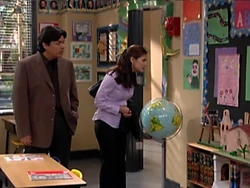Out of all the 600 shows that aired in 2022, only 2.8 percent of them had a disabled character, a jump from 10 years ago where only .6 percent had one. Given the fact that over 26 percent of Americans are differently abled, one can’t help but notice that television has a problem. Disney tried and failed to properly show dyslexia on Shake It Up, and I don’t even want to get started on the half-attempt to represent blindness on CW’s In The Dark. However, the one show that genuinely got it right was George Lopez.
Remember waking up at 3 am to random people jumping up and down on a trampoline? When we weren’t sleeping we were watching George Lopez’s funny and lighthearted life stories. Specifically, I remember George’s and his son–Max’s– dyslexia. Dyslexia is a neurodevelopmental condition where the afflicted may have trouble reading, writing, spelling, or memorizing. 43.5 million Americans (including my eldest brother) have been diagnosed with it. We learn in the third episode of season 2 that Max has dyslexia when a teacher recommends that he enroll into special education courses. Later on, Angie theorizes that George may be dyslexic too as he also displays similar signs when trying to read certain things in the episode. Later on this is confirmed, and George admits that his apprehension to put Max in special education classes came from him trying to protect his son from embarrassment.
Max was lucky to have Angie, his mom, as an advocate. When my brother was approached with the same opportunity to take special education classes, my grandparents–who basically raised him–said no. That no turned into years of torment for my brother, who ended up struggling in almost every class except Math and physical education. Every summer he had to attend classes to catch up, and he still was behind. In the end, he finished high school without a diploma or even a certificate.
In the George Lopez episode, we witness the thought process of two different generations: one that accepts help, and one that denies it. My parents, who were advocates for my brother taking proper courses, lost to my grandparents, who had custody and a lot of pride. That’s the reason we need more representation for disabilities. Shows can turn people into advocates. For example, shows like Atypical and The Good Doctor shined a light on autism, and as a result we’re having more conversations about it.
I’m sure my brother’s story is no different from millions of other Americans who suffer in silence due to shady family members who pride themselves on good presentation versus decent awareness. That’s probably the reason why we don’t see that much representation for differently abled people on television. 2.8 percent is not an accomplishment, it’s a travesty. And I for one would like to see that percentage go up.

